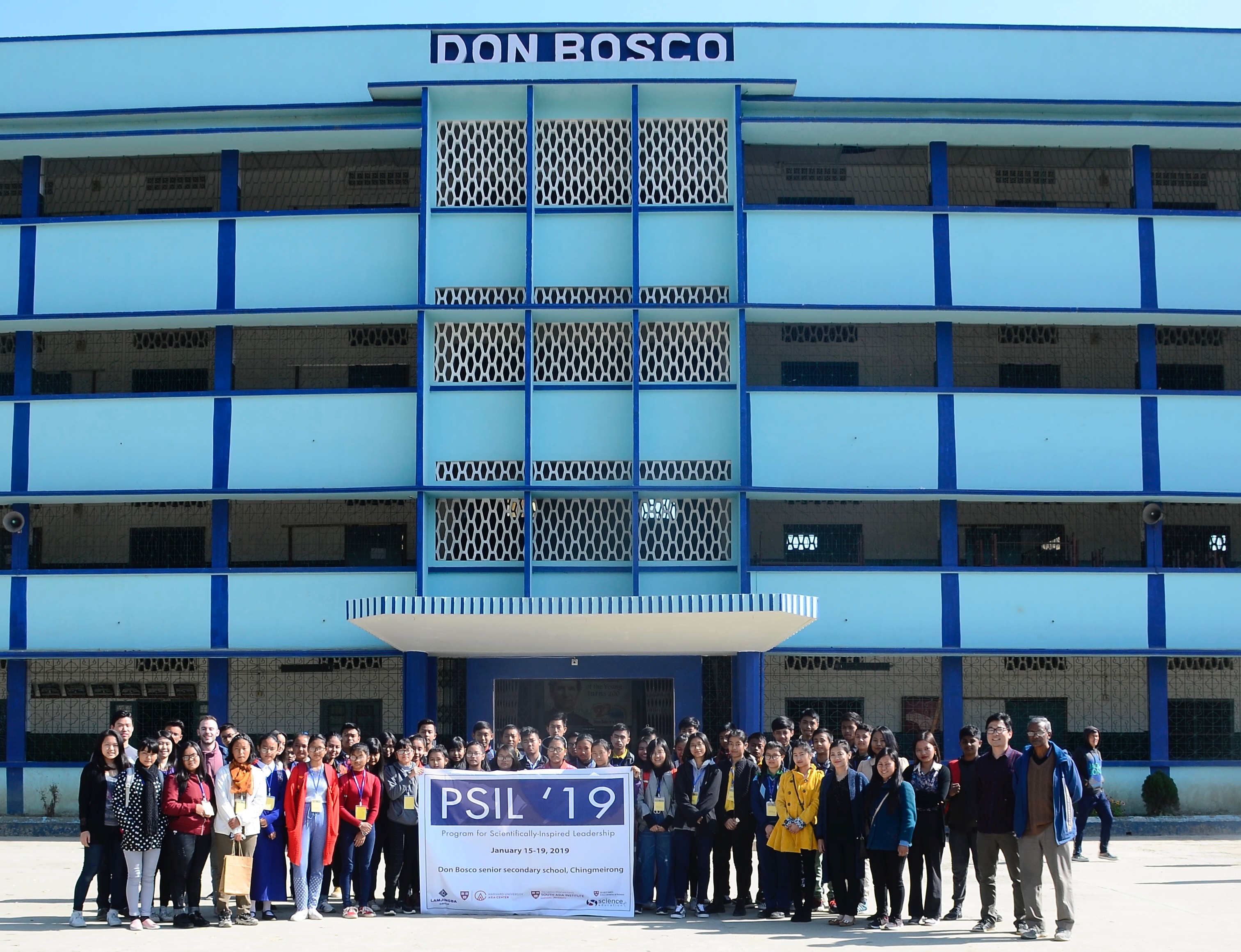
The Harvard team, teaching assistants, high school students, and additional team members stand outside of the Don Bosco school in Manipur.
“I was born there, I work here — and they’re two very different worlds. I’m trying to bring those two worlds together.”
— Dominic Mao
Dr. Dominic Mao, a Lecturer in the Department of Molecular and Cellular Biology at Harvard University, is originally from Manipur, Imphal — a state in the extreme northeastern region of India. Recently, he set out to create a program in Manipur that would engage high school students and college-level teaching assistants in a Western-style educational format. With funding from the Mittal Institute, the Science Education Department at FAS, the Asia Center, and local in-region parties, the Program for Scientifically Inspired Leadership (PSIL) was created. Ultimately, Dr. Mao’s vision led a team from Harvard University to Don Bosco school in Manipur for one week during the 2019 wintersession to deliver the program’s curriculum to local high school students.
“Most initiatives happen in the western part of India, and I wanted to set up an education outreach program in a part of India that people don’t tend to go to. [Imphal is] one of the poorest states in India, and the region has been under political conflict for many years,” Dr. Mao explained. “As a result of conflict, the education system gets hit the hardest. If you have any kind of political instability, the state shuts down, and that eats into school time. If you don’t have opportunities, growth gets limited.”
Dr. Mao and his team set out to break that pattern, visualizing ways to provide Manipur’s high school students with the foundation to create new opportunities for themselves.
Envisioning a New Educational Format in Manipur
“When I came to the United States in 2007 for my PhD, I saw how simple things can really be. You don’t need a lot of infrastructure to set up quality education. [My idea] evolved into this particular program: to take Harvard students and have them serve as teachers to train two populations of students in Manipur. One will be the high school students (the participants of the program), and then there will be teaching assistants (TAs) — college students in the state who are interested in teaching,” Dr. Mao said.
Dr. Mao sought to create a new type of curriculum for Manipur’s high schoolers based around the scientific method. He teamed up with Christopher Li, a Harvard alumnus and Research Assistant at the Belfer Center, who brought with him expertise in education and the South Asian region.
“In founding PSIL, Dominic and I sought to translate core principles of a liberal arts education into a curriculum that could be made available in a short, week-long program … Our objective was not to teach content or material from any academic discipline, but instead to instill and nurture in students the spirit of scientific inquiry and the scientific method,” Christopher said. “That’s what we meant by scientifically-inspired learning: being confident in thinking critically, challenging conventional wisdom, interpreting complex issues, and constructing novel approaches to solve problems, big to small.”
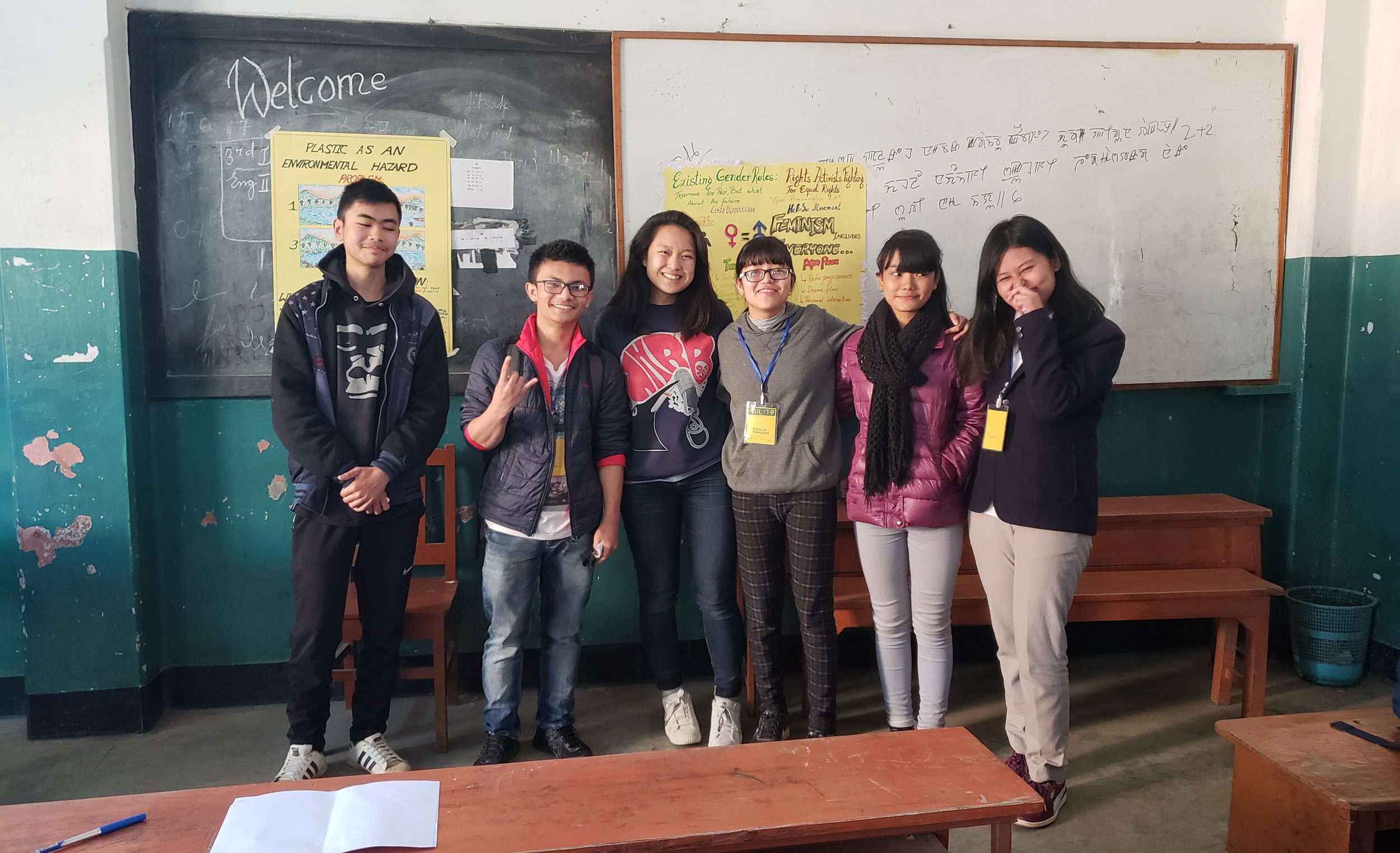
Allison Pao, third from left, with five of the student participants.
Manipur’s Local Teaching Assistants Prove Invaluable
Dr. Mao added three Harvard undergraduate students to his team who would bring the program to life, building a 5-day curriculum to present to about 60 high schoolers from across schools in Manipur with the assistance of five teaching assistants from the region. In this jam-packed week, Harvard undergraduates Sam Kessler, Allison Pao, and Ellen Zhang each gave lectures and labs rooted in the scientific method to students with assistance from the TAs.
The most important part of the experience was the potential for cross-cultural learning. “The primary goal was for the three groups of students to learn from each other,” Dr. Mao explained. With the help of the TAs, the Harvard students gained a greater understanding of the challenges the people of Manipur face, adjusting their curriculum to make it relevant to the region and the context of their student’s lives. “Not only was the local team invaluable in helping the [Harvard] team navigate local challenges, but they also taught us about the culture and history of their home,” Christopher explained — an exchange that “only deepened the curriculum.”
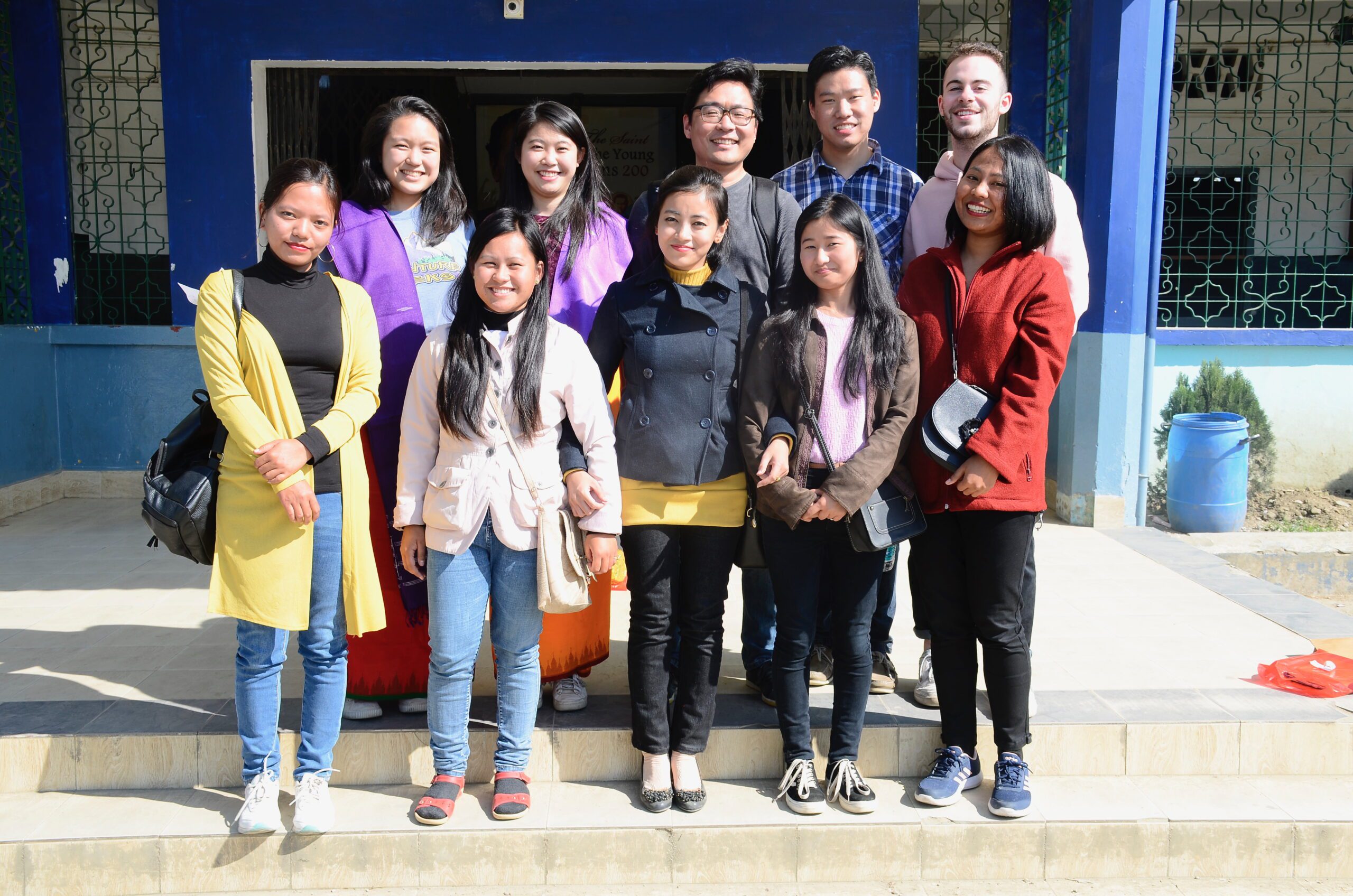
The Harvard team (top row, from left Allison Pao, Ellen Zhang, Dominic Mao, Christopher Li, and Sam Kessler) and the teaching assistants (bottom row, from left Steffi Haokip, Kunjarani Mutum Manjulika Anathem, Jyosita Elangbam, and Diana Toijam) from Manipur stand on the steps of Don Bosco school.
“The teaching assistants helped us to determine the types of examples to use, allowing us to understand the background of the students and what they probably would’ve learned in the past,” Sam commented. The Harvard team built their lectures carefully — ensuring that they weren’t imposing their own viewpoints on the students, but presenting them with tools and frameworks they could use to apply to their everyday lives in their own way.
“We had core lectures, labs, ‘TED Talks,’ a talent show, a career session — where they got to talk to faculty at the university level, an entrepreneur, a news anchor, a retired IAS officer, and a trainer — an open Q&A session with the Harvard students, and a presentation of their group project,” Dr. Mao said.
The experience had a significant impact on the teaching assistants. “I had one TA come to me and tell me how much she enjoyed the poetry session. Music and poetry was a popular and binding theme throughout the program, which is a testament to the universality of these forms of art,” Dr. Mao said. Ellen commented that teaching the poetry session alongside two TAs was one of her most memorable moments, stating, “After reading several of my favorite poems that highlighted the power of poetry, the students and TAs all told me after class how much more enjoyable they found poems and how they hoped to explore [this writing style] more in the future.”
New Pathways for Manipur’s High School Students
Despite their initial nerves, the Harvard team was amazed at the positive reactions they received from the students during the week-long program. “All of the students seemed overwhelmingly excited about it throughout the entire program. It allowed them to think creatively through a structure they wouldn’t normally get,” Sam recounted. Allison added, “A lot of the students told me they had never done group work before — and that was a big thing we did.”
During the week, the students took what they learned and applied it to Manipur’s social problems to propose and develop potential solutions. “The students were so passionate about all of the problems that their state was facing. On the very first day in my lab, we brainstormed a list of social problems in Manipur. They had so many ideas, from crimes against women to frequent strikes in the state,” Allison said.
Christopher described the depth of the labs, noting, “Groups tackled everything from infrastructure development, to political reform, to gender equality in their local communities. It was inspiring to see so many young students eagerly engage with civic and social issues in such creative ways.”
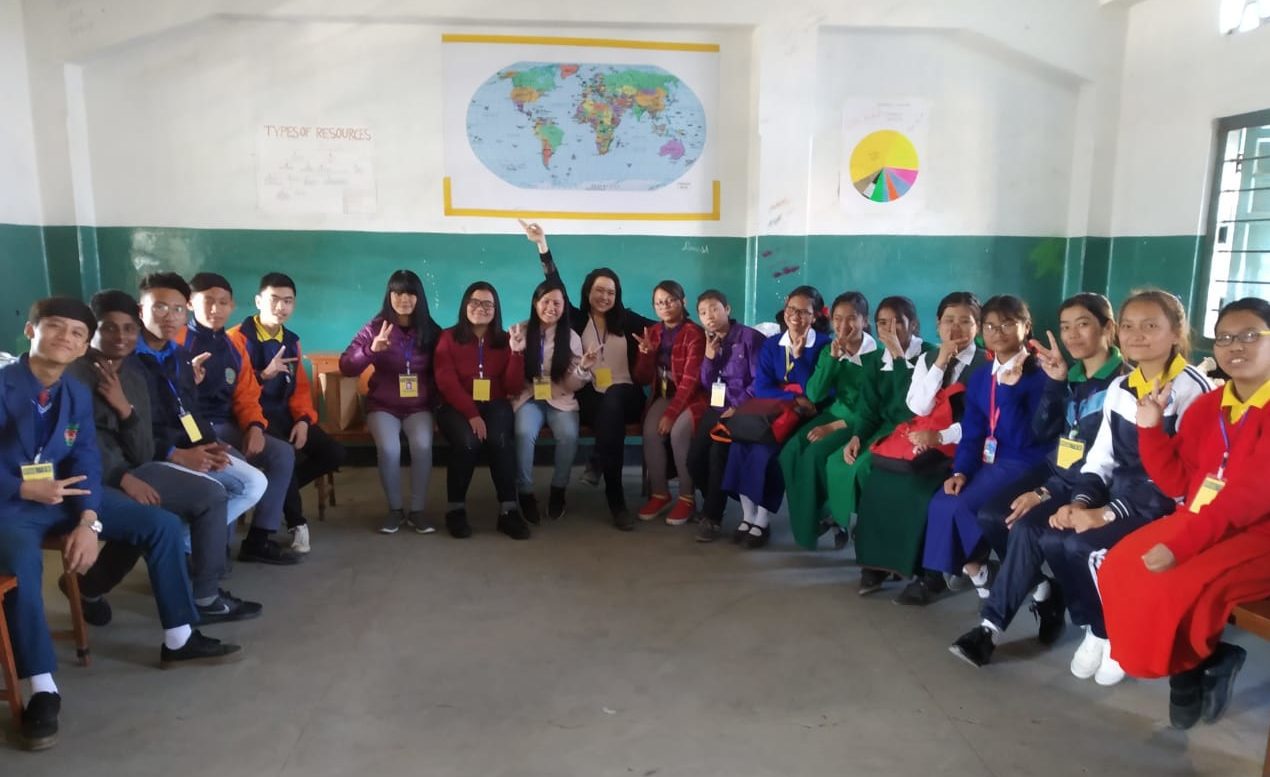
Some of the high schoolers, TAs, and Harvard team involved in the program.
The program opened the high schoolers’ eyes to the potential pathways they could take in life, and the impact of program is already taking root. After the Harvard team left, they learned that the high school students brought what they learned back to their own schools. “Some high school students were asked by their schools to share what they had learned with students in lower grades,” Dr. Mao said. In the week following the program, Allison and Dr. Mao discovered that one of the students even started a feminism group at their school. Now, the high schoolers “are better equipped with information on how to pursue higher education and various career tracks,” Dr. Mao explained.
The program went beyond teaching students problem-solving and critical thinking concepts, giving Manipur’s high schoolers new perspectives and the agency to champion their own ideas in their schools and communities.
The Teachers Become the Students
It wasn’t just the high schoolers of Manipur and the TAs who learned from the lessons — the Harvard undergraduates learned a thing or two, as well. Each of them commented on the impact it had on their global perspective or the future of their own education and careers.
“I really loved the educational component of it, and cross-cultural education is something I was excited about before this. The only way to really learn about a place is to experience it and to meet people there, and to do what you can to go in there with open eyes,” said Sam.
“[A student] said that the program gave her a broader sense of the world and opportunities. For me, this program gave me new perspectives and experiences that have and will continue to shape the way I view opportunities, education, and mentorship as I go forward,” commented Ellen.
“It was really empowering to know that we were doing this for the first time ever. That was a little bit daunting at times, but I think that was what made the experience so rewarding: knowing that we able to build something from nothing,” said Allison Pao. “Just being in Manipur, it’s about experiencing a different way of life. I think a lot of us might have come in [to this program] with a Harvard mindset, but in Manipur things are based upon the strengths of relationships.”
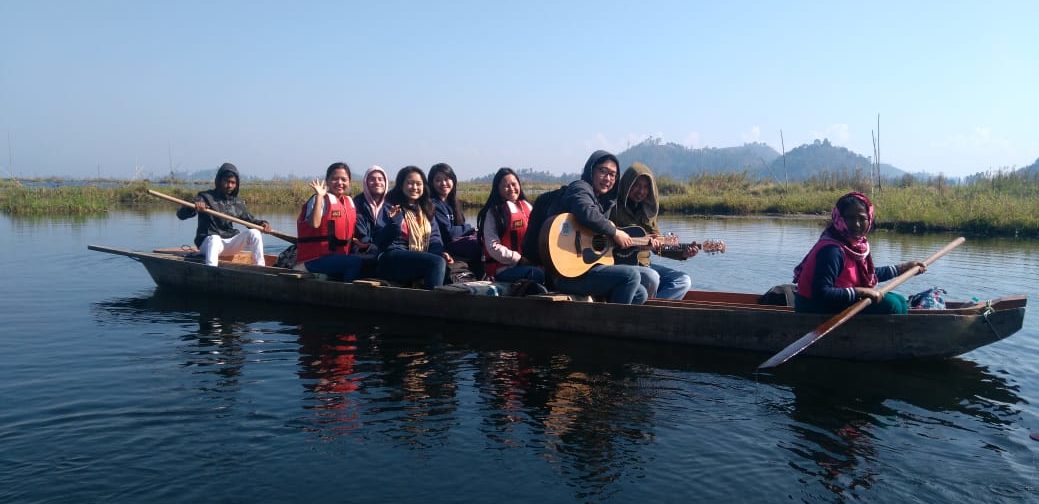
One of the numerous cultural and educational activities the Harvard team experienced in Manipur.
Imphal: a Home Away from Home
The experience also served as cultural enrichment for the Harvard team, exploring historic sites including a British war cemetery and an Ema market managed exclusively by women, sampling the local cuisine, and spending a night at Loktak Lake in a hut built atop phumdi, or water weeds. They were surrounded by a welcoming atmosphere in Manipur the entire week. One day, when it came time to cook dinner, Dr. Mao had a few helping hands. “By the end of the day, I looked so tired that the two wonderful people who were responsible for driving us around offered to cook on my behalf (I have to say they did a much better job). The fact that they so willingly jumped in to help out beyond their official duty was heartwarming,” he said.
The entire Harvard team shared the same sentiments, commenting that Imphal itself became so familiar within just one week. “What made the program so special is that at the end it almost felt as if Imphal was another home. We were already so comfortable with the TAs and the students, and we had done so much that it felt like we had been there so much longer,” Allison said. For the Harvard students, the trip wasn’t just an experience to put on a résumé — it was a social exchange that deeply impacted their perspectives and understandings of different cultures.
When asked if they’d return to Imphal for a second round of the program if given the opportunity, everyone gave the same, resounding answer: yes.
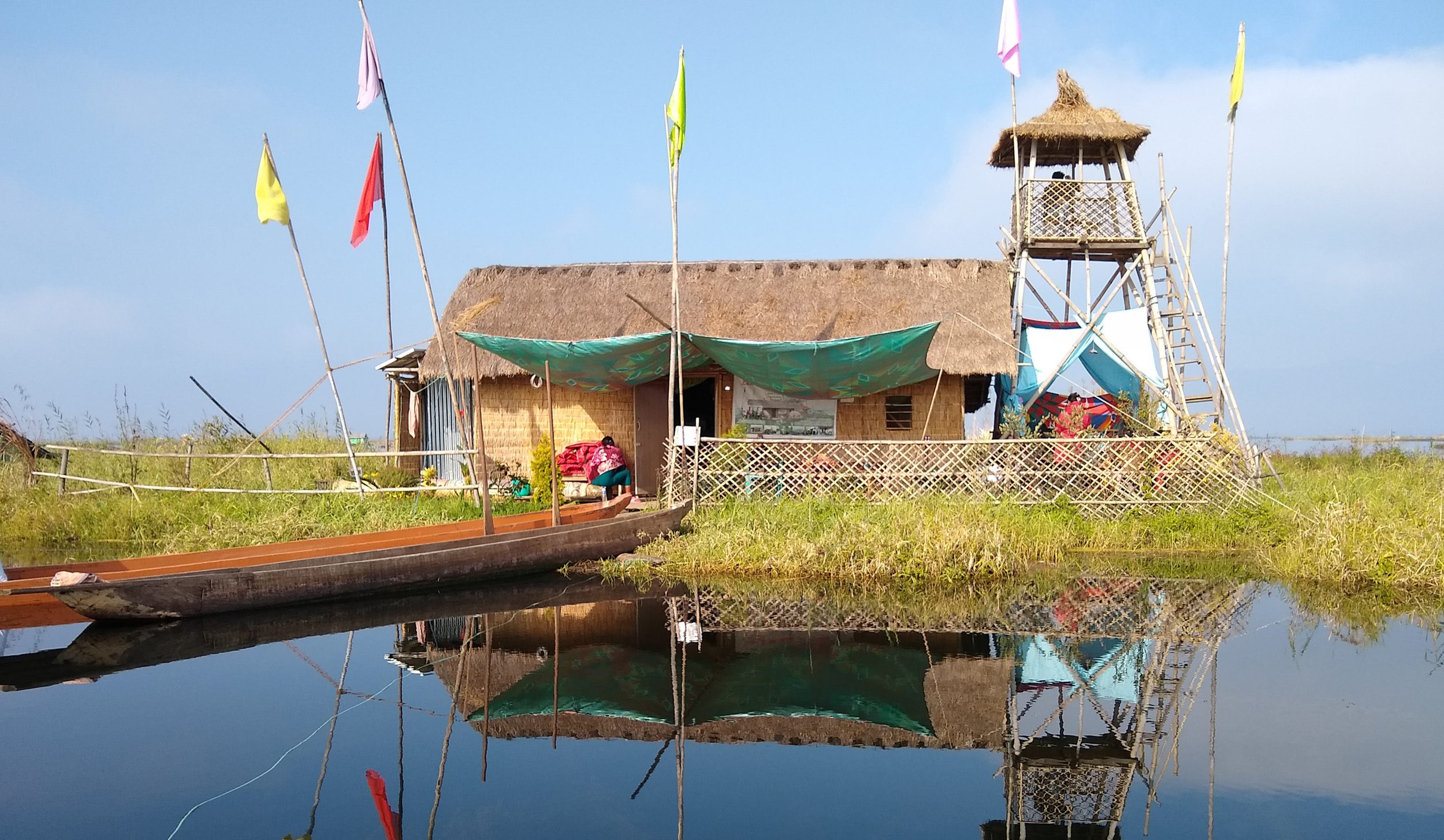
The home that the Harvard team resided in for a night on Loktak Lake.
